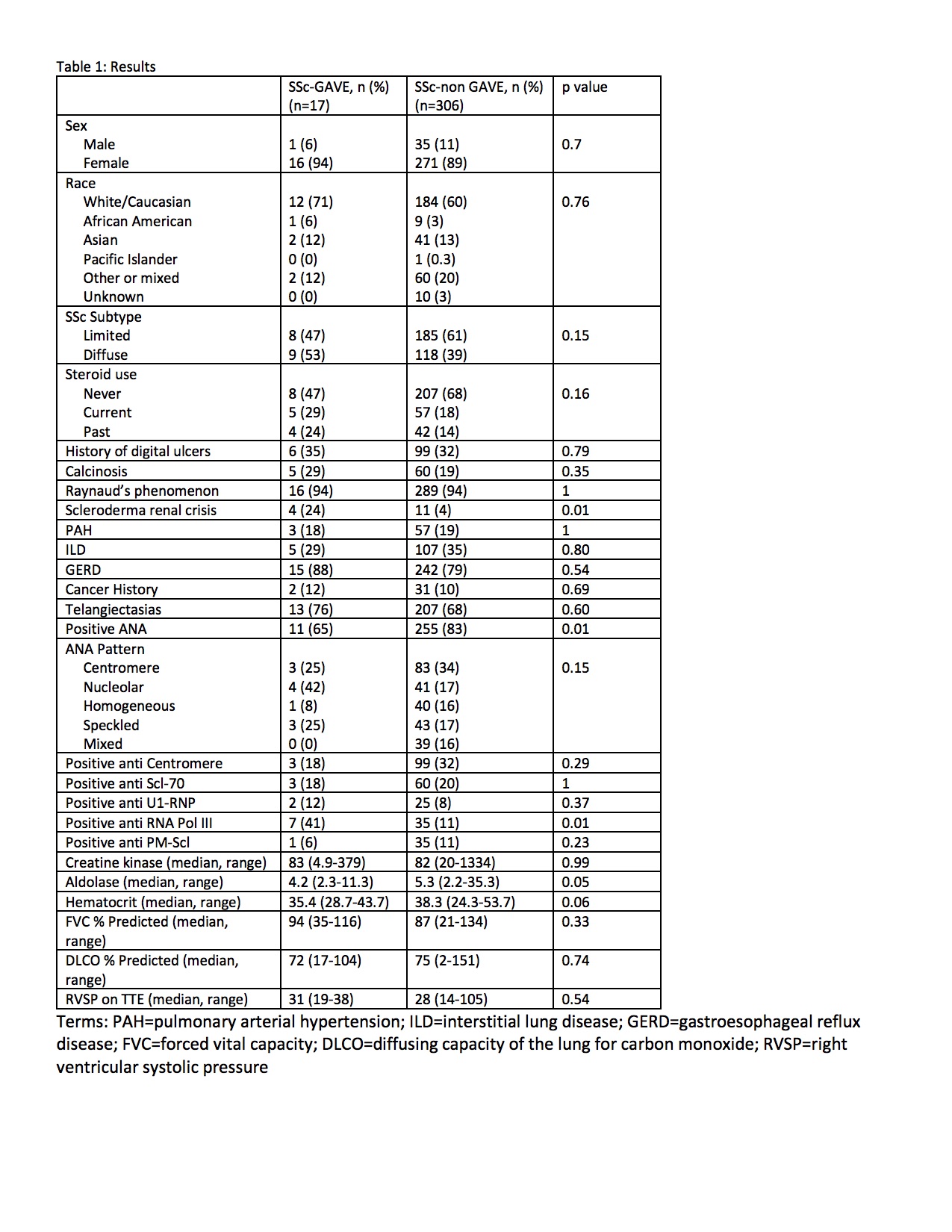Session Information
Session Type: ACR Poster Session A
Session Time: 9:00AM-11:00AM
Background/Purpose: Gastric Antral Vascular Ectasia (GAVE) is a vascular manifestation of systemic sclerosis (SSc) characterized by erythematous streaks and longitudinal rugal folds in the stomach on upper endoscopy. Estimates on the prevalence of GAVE in SSc patients range from 1-22%. GAVE can lead to iron deficiency anemia or acute gastrointestinal (GI) bleeding. Endoscopic laser therapy is effective in the treatment and prevention of GI bleeding related to GAVE. We aimed to identify risk factors for GAVE to improve early identification and treatment of these patients.
Methods: We performed a retrospective analysis of prospectively collected data on SSc patients with and without GAVE seen at Stanford between 2004 and 2018. All patients fulfilled 2013 ACR/EULAR classification criteria for SSc. We collected and compared data on demographics, clinical features, autoantibodies, and laboratory findings in those with and without GAVE. We used Fisher’s exact test to compare categorical variables, and Wilcoxon rank-sum test for continuous variables. Multivariate logistic regression including variables with p-value less than 0.1 was performed to identify predictors of GAVE.
Results: A total of 323 patients with SSc were included in this study, of whom 17 (5.3%) had GAVE. GAVE was significantly associated with scleroderma renal crisis (SRC), negative ANA, positive anti-RNA Polymerase III antibody, lower aldolase, and a trend toward lower hematocrit (Table 1). Given the high correlation between SRC and anti-RNA Polymerase III, only the latter was included in the multivariate logistic regression model. ANA negativity (OR 4.76 (95% CI 1.43 – 15.82), p=0.01) and anti-RNA polymerase III positivity (OR 4.5 (95% CI (1.13 – 17.92), p=0.03) remained significant predictors of GAVE.
Conclusion: We found a prevalence of GAVE of 5.3% in our cohort. A negative ANA or positive anti-RNA polymerase III antibody increases the risk of GAVE by more than 4-fold. Further studies are necessary to determine whether patients with these antibody profiles should undergo screening endoscopies for GAVE.
To cite this abstract in AMA style:
Serling-Boyd N, Li S, Fiorentino D, Becker L, Fernandez-Becker N, Clarke J, Chung L. Identification of Risk Factors for Gastric Antral Vascular Ectasia (GAVE) Among Systemic Sclerosis Patients [abstract]. Arthritis Rheumatol. 2018; 70 (suppl 9). https://acrabstracts.org/abstract/identification-of-risk-factors-for-gastric-antral-vascular-ectasia-gave-among-systemic-sclerosis-patients/. Accessed .« Back to 2018 ACR/ARHP Annual Meeting
ACR Meeting Abstracts - https://acrabstracts.org/abstract/identification-of-risk-factors-for-gastric-antral-vascular-ectasia-gave-among-systemic-sclerosis-patients/

